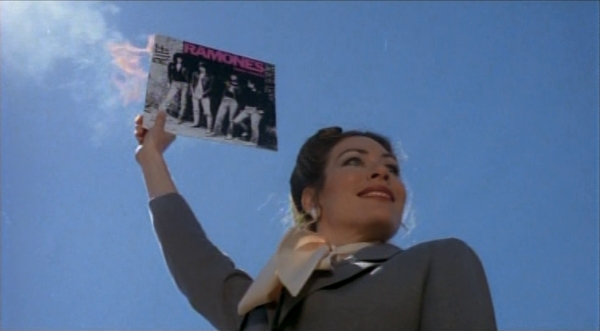Kate: Look at your math book — it looks brand new. Bet you’ve never even opened it.
Riff: I only use it on special equations.
The Ramones’ two-decade career generated fourteen studio albums, seventy-one singles and no shortage of line-up changes, but — sadly — only one Roger Corman-produced high school comedy . Luckily, it’s wonderful — a cult favorite that manages to perfectly capture the energetic, hard-rocking-but-strangely-innocent vibe of the band themselves.
While a lot of the film’s appeal lies in the goofy charm of the band themselves, director Allan Arkush and his buddy Joe Dante wisely set the scene with a bunch of Actual Actors. The ensemble cast includes some classic high school stereotypes – the class genius who needs to relax (Dey Young), the athletic guy who’s too clean-cut to get the girl (Vince Van Patten), the terrifyingly authoritarian new headmistress (Mary Woronov) and, of course, P.J. Soles as Riff Randell, the punk-rock loving free spirit who is perfectly poised to turn all of their lives upside down.
It takes almost forty minutes for any actual Ramones to appear on screen, but their music has a powerful impact from the very start — Riff stealing her music teacher’s stereo to blast the school with the movie’s often-deployed theme song and cause spontaneous outbreaks of dancing. When the band do finally appear, they make one of the all-time great cinematic entrances; playing “I Just Want To Have Something To Do” standing up in the back of a vintage convertible.
It’s fair to say that none of the band are natural actors — it’s genuinely unclear if Dee Dee even knows he’s in a movie — but Joey’s awkward charm and gangly 6’6” frame at least make him an interesting screen presence. The film is aware of this though, and wisely deploys them mostly in killer musical sequences, whether they’re blasting through high-speed hits during the big concert finale or appearing in Riff’s fantasies — in a wonderful scene, she wanders from her bedroom, serenaded by Joey, pausing to spot Marky drumming from her window, and then finds Dee Dee playing bass, fully dressed, in her shower.
Outside of the music, the real reason that Rock ‘n’ Roll High School holds up so well is its sense of humor: nearly every scene is packed with brilliant/stupid/brilliantly stupid background gags, puns, and surreal running jokes. Woronov’s early declaration that rock ‘n’ roll music “causes mice to explode” initially feels like a dumb non-sequitur, but the concept keeps returning to the story in unexpected ways until it feels like a weird bit of genius. There’s a Zucker-Abrahams-Zucker quality to a lot of the gags — a year before Airplane! — and the cast get the most out of every line, whether it’s Paul Bartel’s music teacher asking who the “Ramoneys” are or Dick Miller’s memorable cameo as the police chief, labelling the band “ugly, ugly people”.
It’s a film that, like many Corman offerings, was essentially made to cash in on a trend. But in the capable hands of Arkush and Dante it has a surprising depth to it; it’s the kind of film where every character has something fun to offer and every viewing leads to a new favorite quote (although “do your parents know you’re Ramones?” is hard to beat). There are so many weird little details to enjoy that I’m not sure I could ever get sick of it, and the memorable soundtrack is the icing on the cake.
Rock ‘n’ Roll High School was enough of a cult hit to spawn one direct sequel — an absolute atrocity that dares to answer the question “who could possibly replace the Ramones?” with “uh… Corey Feldman?” — but also an unofficial spiritual prequel, Shake, Rattle & Rock, that brought Allan Arkush and a few of the stars back to tell a 50s-set story about the dangers of rock ‘n’ roll. It owes a lot to Hairspray but finds a way to tell its own story and captures the spirit of its predecessor far better than any number of Coreys ever could.

